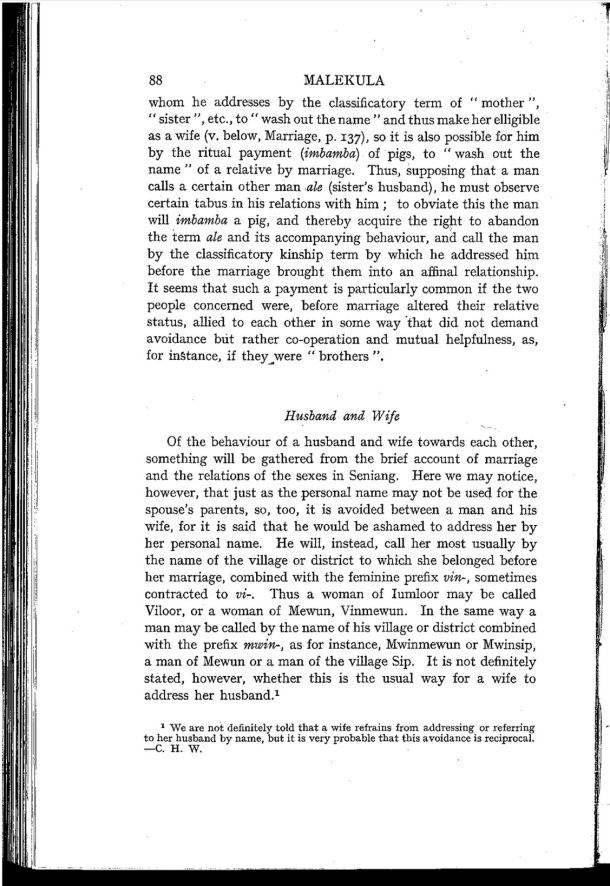|
|  [Note: this transcription was produced by an automatic OCR engine]
<
,
is
r:
zl
_=, _ _
_._|._. N _
r 1
‘X
1
,1
ll
,
88 MALEKULA
whom he addresses by the classiï¬Åcatory term of “ mother â€ù,
“ sister ", etc., to “ wash out the name " and thus make her elligible
as a wife (v. below, Marriage, p. I37), so it is also possible for him
by the ritual payment (imbamba) of pigs, to “wash out the
name â€ù of a relative by marriage. Thus, supposing that a man
calls a certain other man -ale (sister's husband), he must observe
certain tabus in his relations with him ; to obviate this the man
will imbambu a pig, and thereby acquire the right to abandon
the term ale and its accompanying behaviour, and call the man
by the classiï¬Åcatory kinship term by which he addressed him
before the marriage brought them into an aï¬Ånal relationship.
It seems that such a payment is particularly common if the two
people concerned were, before marriage altered their relative
status, allied to each other in some way that did not demand
avoidance but rather co»0peration and mutual helpfulness, as,
for instance, if they_were “ brothers ".
Husband and Wife _
Of the behaviour of a husband and wife towards each other,
something will be gathered from the brief account of marriage
and the relations of the sexes in Seniang. Here we may notice,
however, that just as the personal name may not be used for the
spouse’s parents, so, too, it is avoided between a man and his
wife, for it is said that he would be ashamed to address her by
her personal name. He will, instead, call her most usually by
the name of the village or district to which she belonged before
her marriage, combined with the feminine preï¬Åx win-, sometimes
contracted to vi-. Thus a woman of Iumloor may be called
Viloor, or a woman of Mewun, Vinmewun. In the same way a
man may be called by the name of his village or district combined
with the preï¬Åx mwin-, as for instance, Mwinmewun or Mwinsip,
a man of Mewun or a man of the village Sip. It is not deï¬Ånitely
stated, however, whether this is the usual way for a wife to
address her husband}
' We are not deï¬Ånitely told that a. wife refrains from addressing or referring
to her husband by name, but it is very probable that this avoidance is reciprocal.
7
'1
ll
5|
2
ii]
1
-v
r
1
1
+
i F
|